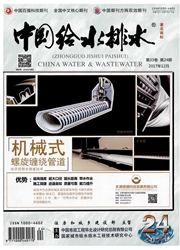

 中文摘要:
中文摘要:
以高碑店污水处理厂的浓缩污泥作为生物沥浸对象进行脱水预处理,研究了生物沥浸细菌的培养及其对污泥脱水性能的影响。将回流污泥上清液分别接种到SM液体培养基和9K液体培养基,通过分离培养、富集获得以氧化硫硫杆菌和氧化亚铁硫杆菌为主的生物酸化细菌,不断转接使培养基pH值降到2以下所需时间由最初的8~10d缩短到3—4d,然后共同接种到浓缩污泥中,经强化培养获得生物沥浸的接种物。不同营养物质投加量的沥浸试验发现,当其他条件保持一致时,S投加量为2g/L的试验组降低体系pH值、提高体系ORP的能力要强于投加量为1g/L的试验组;在S投加量一定的情况下,FeSO4·7H2O投加量〉2g/L时生物沥浸效果较好。生物沥浸后污泥的脱水性能得到显著改善,经板框脱水可使泥饼含水率降到65%以下。
 英文摘要:
英文摘要:
Taking the thickened sludge from Gaobeidian WWTP as bioleaching study object for dewatering pretreatment, the culture of bioleaching bacteria and its influence on dewaterability of sewage sludge were investigated. The supernatant of return sludge was directly inoculated into the SM liquid medium and 9K liquid medium for the culture and enrichment of acidophilic bacteria which were mainly composed of Thiooxidans and ThiobaciUus. The time required for declining the medium pH to below 2 was shortened from the initial 8 - 10 days to 3 - 4 days by continuously transferring. Then the two enriched bacteria were inoculated into the thickened sludge for strengthening culture to get the bioleaching inoculure. Through the experiments of different dosages of nutrients in bioleaching, it was found that when the dosage of S powder was 2 g/L, its ability of reducing pH and improving ORP in sewage sludge bioleaching system was stronger than that of 1 g/L in the group whose other experimental conditions were consistent. Keeping the dosage of S powder constant, the effect of sludge bioleaching was better when the dosage of FeSO4·7H2O was higher than 2 g/L. The dewaterability of sludge was significantly improved after bioleaching, and the moisture content of dewatered sludge cake could be reduced to less than 65% by plate-frame pressure filtration.
 同期刊论文项目
同期刊论文项目
 同项目期刊论文
同项目期刊论文
 期刊信息
期刊信息
